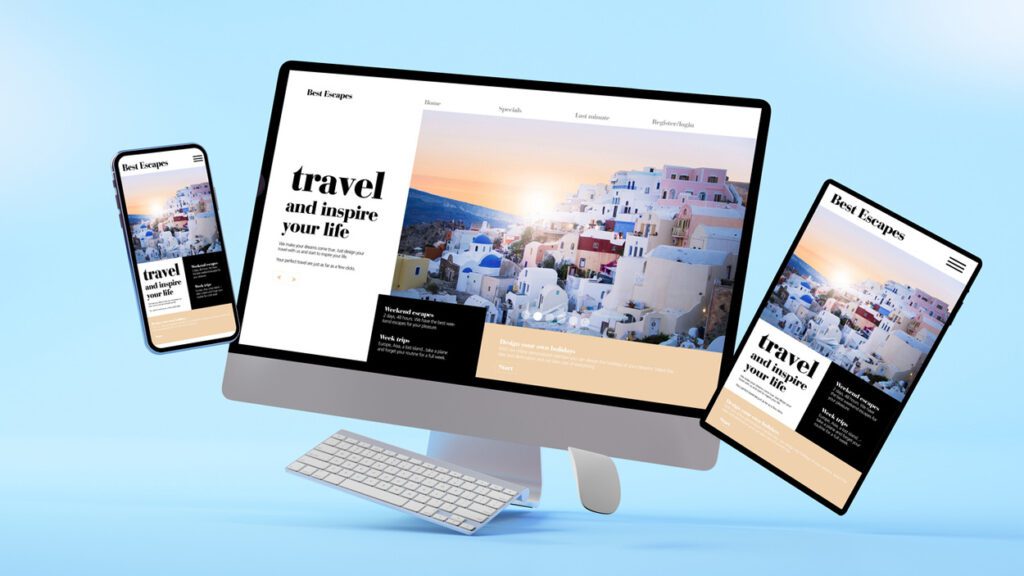When you’re busy creating unforgettable experiences around the world, website development may not be your number one priority. But with an astonishing 83% of travel booked online, your travel agency needs to be noticeable to an increasingly digital audience.
Building a travel website may seem overwhelming, but with the right approach, it can become a powerful platform to catapult your travel agency into the next dimension. Our step-by-step guide will guide you through the process of developing a travel website, all the way from planning to launch.
Do I Need a Travel Website?
Well, that’s an easy answer – Yes! While brick-and-mortar travel agents certainly have a place in the travel market, having an online presence is essential to succeed. A professional website offers global reach and 24/7 availability. It offers the ability to interact and sell travel via social media, to showcase services and expertise and to harness the immense power of AI and machine learning – now vital to creating personalized itineraries in the travel industry.
Travel Website Essentials

Building a travel website is about converting visitors into customers.
Most travelers nowadays aren’t willing to wait when it comes to booking their travels; they demand perfection in a click. Building a travel website requires a compelling mix of design and expert functionality. From stunning photos to easy navigation, a travel website must spark a spirit of adventure and a hunger to explore.
Planning and Strategy
Whether you’re building a search and booking website, a cruise aggregator or a tour packaging solution, the first thing you’ll need to do is develop a strategy to make your website a success. Identify the purpose of your website and select your niche. Choosing your niche is crucial. Your niche defines who you are trying to reach. Think about who your target audience is and what your brand image represents. Perhaps you’re focusing on corporate travel, or cruise holidays…whatever your passion is, your website needs to encourage others to choose you.
Defining your niche attracts the right audience…and improves your Google rankings!
Domain and Hosting
Your domain name is your online identity. It should be relevant to your niche and memorable. Domain names that are short and simple are easier to remember, and they can also be integrated into your travel agency’s branding and image. Avoid special characters, numbers and hyphens as they are often misinterpreted.
Select a Platform
Next, you’ll need a CMS (Content Management System) or builder. A CMS provides the flexibility to update promotions, add new tour packages, manage bookings and edit other website content such as blog posts and destination guides. It allows for more personalized, dynamic content so customers view your website in real-time, creating a better user experience.
Content and Features
A travel website needs advanced search and booking facilities, a secure payment gateway, engaging visuals and informative content. Typical features that a user might expect include:
- Search and booking engine
- Maps and itineraries
- Destination photos and videos
- Reviews and testimonials
- Live chat or chatbot service
Optimize Your Website
A fast, responsive website is essential for a travel agent to avoid potential customers going elsewhere. And mobile functionality is key. Ensure you implement effective SEO strategies, including keyword research for destination-specific terms. Utilize social media platforms to gain valuable traction.
Monetize Your Website
As your website traffic increases, you can use it to create revenue streams through affiliate marketing, advertising and sponsored content. Partner with airlines, hotels, and other travel businesses to earn a commission each time a customer books through your link and collaborate with associated brands to generate advertising revenue through sponsored blog posts, reviews, or social media promotions. You can offer digital guides for sale, packing lists and other helpful literature.
White Label Solutions

If you’d rather leave web building to the professionals, buying a white-label solution could be the answer. A white-label website is a generic platform developed by one company which is then purchased and rebranded by another. It is a solution that offers many benefits; purchasing a finished product and then rebranding it means you can enter the market quickly. No lengthy development and testing schedules – your website will hit the ground running. And the cost of your travel website will be significantly lower than if you invested in building a website from scratch.
Many white-label solutions allow for easy customization, meaning they can be personalized to match your specific needs.
A white-label solution can save vast amounts of development time, allowing travel agents to focus on what they do best – creating unforgettable journeys.
Cruise Website Builder
For those in the business of selling cruise holidays, a white label travel portal with robust API technology can provide travel agents with a finely tuned booking solution. Managing large amounts of data and presenting it in real-time to potential customers can prove challenging and costly. Buying an off-the-shelf solution and tailoring it to your brand is a fast, affordable method to enter the lucrative cruise market. It offers a quick-to-market launch, low upfront investment, access to the vast cruise inventory and the potential to scale your services up or down.
A white-label travel website is a pre-built platform developed by a third-party. It is rebranded and integrated into a travel agent’s data using API technology. Traveltek have developed a suite of website builder technology to put your travel agency firmly on the map. Our white-label and bespoke front-end solutions can be tailored to suit your individual needs. Why not book a demo with Traveltek now.
Frequently Asked Questions
How much does it cost to build a travel website?
The cost of building a travel website varies depending on size, complexity and third-party integrations. A DIY white label option can provide excellent value for money, cutting out much of the initial development work and allowing you to add your own branding and features.
What is a travel portal?
A travel portal is an online platform that enables users to search for and book services like flights, hotels, car rentals and other travel ancillaries. It is an all-encompassing, dynamic interface.
Is it cheaper to book travel through an online travel agent?
While online travel agents are often cheaper for straightforward trips, an in-person travel agent can provide value for money when dealing with complex itineraries, offering personalized experience and expertise. They also have access to exclusive deals and preferential discounts.
What are white label websites?
A white label website is one that was developed by a third-party, then sold to another business and rebranded.
What is an API?
Application Programming Interface (API) allows a travel website to connect with external sources such as airlines and hotels, and access real-time pricing and availability data. The data is integrated into a travel agents platform using an API.




